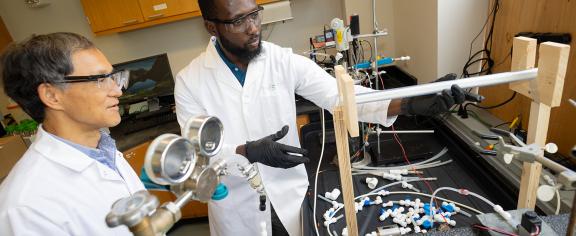2025-07-24
Experts say that more accurate depictions of sharks can help protect them and highlight their role in global ecosystems.
2025-07-18
A Georgia Tech study warns that rising lunar traffic could lead to costly collision avoidance maneuvers, urging better coordination to manage growing risks in cislunar space.
2025-07-14
A study has found that women in climate science are just as productive and successful as their male peers when it comes to journal publications, but are 90% as likely as men to maintain their careers.
2025-07-10
A new study shows how the material made from leaves and branches that collect on forest floors can be mixed with local soil to filter out road grime before it reaches waterways.
2025-06-25
When scientists spot an asteroid whose trajectory might take it close to Earth, they monitor it frequently and calculate the probability that it might collide with our planet.
2025-06-25
As the White House accelerates plans for a 2026 crewed mission to Mars, Georgia Tech experts highlight the engineering, scientific, and diplomatic challenges that will shape the success—and sustainability—of humanity’s next giant leap.
2025-06-19
Ocean waters are getting greener at the poles and bluer toward the equator, according to an analysis of satellite data published in Science on June 19.
2018-04-18
The earth is finally beginning to make way for The Kendeda Building for Innovative Sustainable Design.
2019-04-19
The degree program will help educate the next generation of sustainability leaders for corporations, government, and non-governmental organizations.
2025-06-12
City’s New Rule Could Shape Broader Change to Protect Heat-Vulnerable Cities








